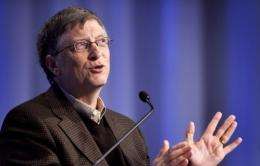TED takes on 'What the world needs now'

Let the mind-bending begin! A TED conference that attracts brilliant minds and challenges them to solve humanity's ills got underway Tuesday in the southern California city of Long Beach.
The theme of the gathering is "What the world needs now."
Microsoft co-founder turned philanthropist Bill Gates will expound on innovation and clean energy in a block of talks titled "Boldness."
Singer and activist Sheryl Crow is part of an "Action" block along with chef Jamie Oliver, who envisions transforming "the way we feed ourselves."
Former CIA covert operative Valerie Plame Wilson is part of a "Provocation" line-up that includes Christopher "moot" Poole, founder of a 4chan.org online community steeped in anonymity.
Iconic musician David Byrne of Talking Heads band fame will share insights during an "Invention" block along with game designer Jane McGonigal, who contends that "reality is broken" and should be reformatted as a game.
Film director James Cameron whose 3D movie "Avatar" shattered box office records is part of "Wisdom" talks that will include John Kasaona, who is leading a drive to turn poachers into wildlife protectors in Namibia.
Scientists, authors, researchers, economists, musicians and more, some famous and others hardly known, will step on stage bound only by TED curator Chris Anderson's plea to give "the talk of their lives" in 18 minutes each.
Organizers of the annual gathering promise last-minute surprises and daringly honest talks certain to trigger fury and thought.
"We are looking for 21st Century solutions to 21st Century problems," Jared Cohen, a policy staff member for US Secretary of State Hillary Clinton, said as he arrived at TED. "This is a perfect place to be."
The conference opened with a TED University session packed with rapid-fire presentations ranging from the potential for doctors to turn "the disabled into the super-abled" to a battle to save wildlife in Brazil.
Effect Partners chief executive Michael Martin told of dodging a tornado in the United States only to find that lessons learned served him well during the recent global financial meltdown.
"I couldn't control what was happening to me, but I could control my reaction to it," Martin said of both scenarios. "Stay positive, show strong leadership, create a safe space, and know it will ultimately pass."
California Cars Initiative founder Felix Kramer preached about the benefits of running in bare feet, while orthopedic surgeon Kevin Stone told of breakthroughs in using animal tissue to rebuild battered knees stronger than they started.
Oncologist Daniel Kraft spoke of the potential for technology and medicine to fuse in a near future in which treatments are tailored to individual genetics and "microbots" regulate immune systems and clear clogged arteries.
"I think technologies are coming together for an ability to cure the well before they get sick," said Kraft, a stem cell researcher.
Frederick Balagadde, a TED Fellow from Uganda who works at Lawrence Livermore National Laboratory in California, described his mission to build "microfluid" technology into an inexpensive iPhone-sized device for diagnosing HIV/AIDS.
Such a gadget will enable doctors to better treat infected people in poor countries.
"This will let us realize treatment in the Third World at a cost that is affordable and actually make the world a better place," Balagadde said.
Jonathan Drori, a board member of the Royal Botanic Gardens in Britain, gave a comically captivating tour of the world of pollen.
Backing his presentation with photographs, Drori provided a glimpse into the sex lives of plants and into how pollen "forensics" is used to pinpoint origins of counterfeit cash and illegal drugs as well as solve murder mysteries.
"Plants have rampant, promiscuous and really quite interesting and curious sex," Drori assured an amused audience.
Phil Zimbardo, known for a disturbing Stanford Prison study, outlined efforts to use Internet technologies to bring out heroes in ordinary people.
"Heroism is the antidote for indifference and evil," Zimbardo said.
(c) 2010 AFP


















